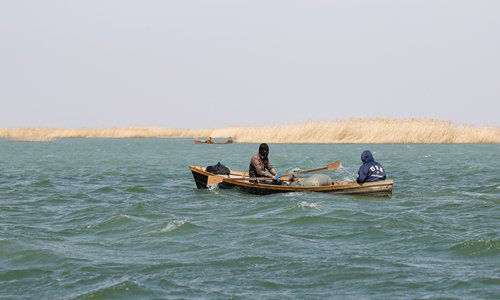
Fishermen row a boat on the Aral Sea outside the village of Karateren, south-western Kazakhstan, on April 15, 2017. Photo: VCG
After five years of joint scientific research, Chinese and Uzbek scientists have revealed key factors behind the shrinking of the Aral Sea over the past 20 years, including climate warming and a lack of water-saving technology in farmlands.The Aral Sea, located between Kazakhstan and Uzbekistan, was once the world's fourth-largest inland waterbody. It has shrunk remarkably since 1960. Over the decades, its surface area dwindling from 67,000 square kilometers in 1960 to just 6,000 square kilometers in 2020.
Most findings consider farmland expansion as the main cause behind the contraction of the Aral Sea.
"But since 2000, the farmland in the Aral Sea basin has stopped expanding," said Chen Xi, director of the Research Center for Ecology and Environment of Central Asia under the Chinese Academy of Sciences.
The latest research showed that rising temperatures, a lack of water-saving technology in farmlands, wetland expansion in the middle and lower reaches, and a large amount of water storage in upstream hydropower stations, had all accelerated the shrinkage of the Aral Sea over the past two decades, Chen said.
The dried shores produce salt dust, posing a serious threat to the local ecological environment and people's health.
Scientists from both China and Uzbekistan put forward a roadmap for the ecological restoration of the dried lake areas. They divided the Aral Sea into various sections, which will be treated with tailored measures.
Chen said that water-saving technology is an important way to solve ecological difficulties in Central Asian countries.
"Sixty percent of Uzbekistan's water resources are used for cotton planting. Efficient water-saving technologies can save 8 to 10 billion cubic meters of water for Uzbekistan each year, which can be used for restoration of the Aral Sea."



